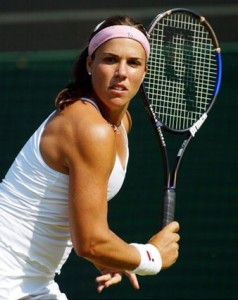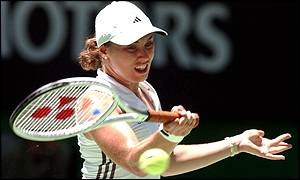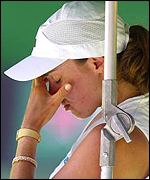Australian Open Rewind: 2002, The Rise and Fall of Capriati vs. Hingis

Jennifer Capriati defeated Martina Hingis in a memorable 2002 Australian Open final.
Jennifer Capriati and Martina Hingis competed against each other in one of the finest women’s matches in the past decade at the 2002 Australian Open.
Ironically, both started playing competitive tennis at an extremely young age and enjoyed immediate success and acclaim. But both endured controversy and ended their careers prematurely.
Capriati was pushed along early by her father, playing her first professional match in 1990 a couple of weeks before she turned 14. The teenager astounded the tennis world by upending some top-ranked players as she skyrocketed to the No. 8 ranking by the end of the year. She even made the cover of Sports Illustrated.
Capriati was young, bubbling over with enthusiasm. The public and the press adored her.
In 1991 she reached the semifinals at Wimbledon and the U.S. Open. In 1992 she won a gold medal at the Olympics. The more success she enjoyed, however, the more pressure people exerted upon her to do more—win more.
1993 saw her begin to falter, losing in the first round of the U.S. Open. Taking time off, the teenager was picked up for shop lifting and later for possession of marijuana. She became an icon of tennis “burnout.” The press was unrelenting in its coverage detailing her downfall.
But Capriati came back in 1996 at age 20. Her climb to the top was steady, and in 2001 she won her first major, the Australian Open, and her second at the French Open, defeating Kim Clijsters. Capriati captured the No. 1 ranking as well.

Capriati claimed her first Grand Slam title at the 2001 Australian Open. She also won the 2001 French Open title.
Hingis also had tremendous success at a very early age, winning her first Grand Slam title when she was 15, partnering with Helen Sukova to win doubles at Wimbledon.
In 1997 she won three of the four Grand Slams, losing only during the French Open final—in the process she became the No. 1 player in the world. Hingis was only 16 years old, turning 17 in September.
By the age of 18, Hingis had captured five Slam titles. Then the tide turned as the era of power tennis took its toll on Hingis’ mastery.
By 2002, Hingis had not won a major in three years. After the famous “meltdown” during her French Open Final with Steffi Graf, Hingis never recaptured her earlier domination.
In 2002 Capriati was finding her way back while Hingis fought to hang on.
Both had made it to the finals of the 2002 Australian Open. It was an extremely hot day, and both players found it difficult to concentrate and keep their energy level high. In the oppressive heat they had to force themselves to keep moving.
Early on in the match, Hingis controlled the baseline and the pace. Capriati could not keep up with the penetrating ground strokes off the Hingis racket. She fell behind early, 5-1.
Even though Capriati managed to break Hingis twice in the opening set, she lost 6-4. The Swiss captured the opening set and then went on to build an almost insurmountable lead in the second set.

Hingis jumped out to a 5-1 lead in the opening set and won it 6-4.
Hingis’ play delighted her fans starved for a win, waiting for the Swiss to return to the top. In fact, Hingis seemed so dominating it appeared as though she was toying with her opponent.
The truth is Hingis could not find a way to finish off the American, though, and the recognition of this shut down her effectiveness.
Capriati grew increasingly frustrated, and in the second game of the second set, she exploded, yelling at the umpire about a line call and at the crowd to “shut the hell up!” This did not endear her to those assembled. They jeered and whistled.
The American soon fell behind 0-4 in the second set.
But Capriati, defending her championship of a year ago, was not finished. She fought off four championship points, which is a record for match points saved in a Grand Slam final by a player who came back to win the match.
The shift in momentum became almost immediately apparent.
The reason was simple. Hingis typically relied upon her intelligence, her grasp of her opponent’s strategy, and her renowned anticipation to win matches, compensating for her lack of power and foot speed.
On this day in the excessive heat, Hingis fell back and waited for her opponent to lose rather than continuing with the more aggressive style she exhibited early in the match. Hingis stopped moving forward, trying to win.

After losing the second set in a tie-breaker, Hingis lost the final set 6-2.
For example, when she had match points, there were two occasions when Capriati sent back a short ball that Hingis should have attacked to end the point early, but instead she let the ball bounce and returned it deep with topspin and no pace—which is a good defensive shot but not aggressive enough with the match on the line.
Also, it was obvious that Capriati did not do well when Hingis sliced the ball. The slice seemed to throw off Capriati’s timing, causing her to misfire. Hingis failed to recognize this fact and capitalize on it.
If the Swiss had used the slice more during those critical match points, the game might have ended earlier with Hingis the winner.
Capriati became the aggressor and went for the big shots, gambling time after time. Astoundingly, she took the second set into a tiebreaker—which Capriati won, 9-7.
By the third set, Hingis was exhausted, mentally and physically. The heat was a factor on this day for both players, but Capriati was obviously more fit.
The third set was a mere formality. Hingis was never really in it after the tiebreak. The win was likely the most pleasing triumph of Capriati’s remarkable “rise from the ashes” career.
Neither Hingis nor Capriati would ever again play a Grand Slam singles final.
Jennifer Capriati def. Martina Hingis, 4-6, 7-6, 6-2, on that day eight years ago. What a match…














